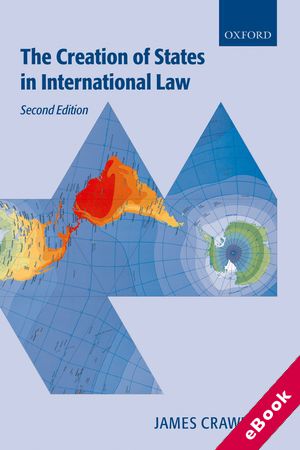
The device(s) you use to access the eBook content must be authorized with an Adobe ID before you download the product otherwise it will fail to register correctly.
For further information see https://www.wildy.com/ebook-formats
Once the order is confirmed an automated e-mail will be sent to you to allow you to download the eBook.
All eBooks are supplied firm sale and cannot be returned. If you believe there is a fault with your eBook then contact us on ebooks@wildy.com and we will help in resolving the issue. This does not affect your statutory rights.
As much as was ever the case in 1979 when the first edition of The Creation of States in International Law published, in the 21st century problems of territorial status and statehood are likely to continue to be a focal point of international disputes.
As Rhodesia, Namibia, the South African Homelands and Taiwan then were subjects of acute concern, today governments, international organizations, and other institutions are seized of such matters as the membership of Cyprus in the European Union, application of the Geneva Conventions to Afghanistan, a final settlement for Kosovo, and, still, relations between China and Taiwan. The remarkable increase in the number of States in the 20th century did not abate in the twenty five years following publication of James Crawford's landmark study, which was awarded the American Society of International Law Prize for Creative Scholarship in 1981.
The independence of many small territories comprising the 'residue' of the European colonial empires alone accounts for a major increase in States since 1979; while the disintegration of Yugoslavia and the USSR in the early 1990s further augmented the ranks. With these developments, the practice of States and international organizations has developed by substantial measure in respect of self-determination, secession, succession, recognition, de-colonization, and several other fields. Addressing such questions as the unification of Germany, the status of Israel and Palestine, and the continuing pressure from non-State groups to attain statehood, even, in cases like Chechnya or Tibet, against the presumptive rights of existing States, James Crawford discusses the relation between statehood and recognition as it has developed since the eighteenth century.
The criteria for statehood and the effect on those criteria of evolving standards of democracy and human rights; their application in international organizations and between States; the creation of States by devolution or recession, by international disposition of major powers or international organizations and through institutions established for Mandated, Trust, and Non-Self-Governing Territories, are also discussed. Apart from the general argument of the normative significance of the legal concept of 'State', and the analysis of the numerous specific cases, this new edition of a landmark book provides a full and up-to-date account of the general development which has led to the birth of so many new States.